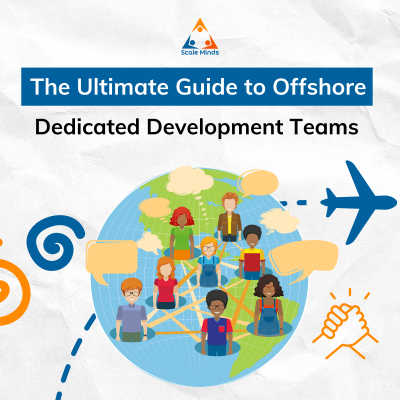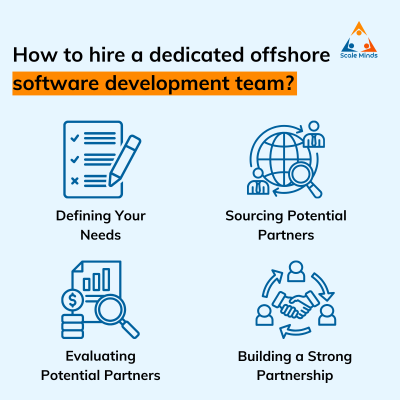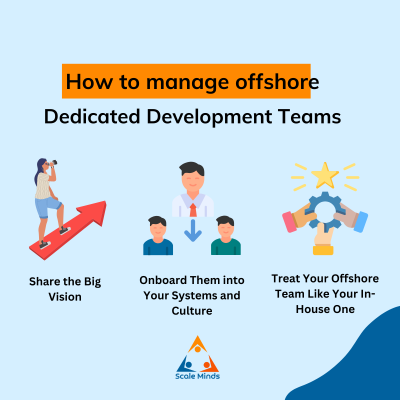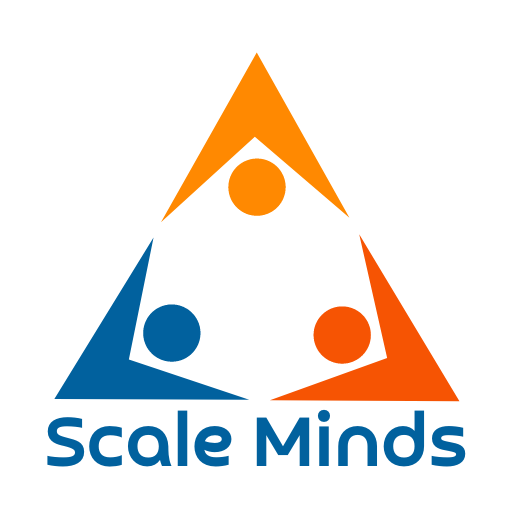Did you know that 70% of businesses believe that building a strong tech team is crucial for their success? Yet, finding, hiring, and retaining top-tier developers can be a formidable challenge. In the relentless pace of the AI era, organizations need to accelerate product development without compromising quality. This is where an offshore dedicated development team becomes a game-changer. By tapping into a global pool of talent, businesses can overcome development hurdles and gain a competitive edge.
This comprehensive guide will equip you with the knowledge and tools to build a successful offshore dedicated software development team.
Whether you’re a startup or an established enterprise, understanding this model is crucial for success.

What is a Dedicated Development Team?
A dedicated development team is a specialized group of software professionals assembled to exclusively work on a single client’s project.
Unlike traditional outsourcing models, where resources are shared across multiple clients, a dedicated team is fully committed to the success of one specific project.
This model fosters a strong partnership between the client and the development team, as the team becomes an extension of the client’s organization. Members are carefully selected based on their skills, experience, and alignment with the project’s requirements.
Characteristics of an offshore Dedicated Development Team:
An offshore dedicated development team possesses several key characteristics that make them effective partners in your project’s success. Here are the primary traits:
- Highly Specialized Skills: Offshore teams often contain experts in specific technologies, programming languages, and best practices. This specialization allows them to understand complex requirements and deliver high-quality solutions tailored to your business needs.
- Cultural Compatibility: Successful offshore teams are not just about technical ability; they also exhibit cultural alignment with the client’s business values and work ethics. This cultural compatibility enhances communication, strengthens teamwork, and minimizes misunderstandings.
- Scalability: One of the prime advantages of an offshore dedicated development team is the ability to scale efficiently. Depending on project timelines or emergent needs, you can easily add or reduce team members, ensuring resources are efficiently utilized without incurring excessive overhead costs.
- Clear Communication Channels: Effective communication is fundamental to any successful partnership. Offshore teams typically establish robust communication frameworks that facilitate regular updates, progress reports, and feedback loops through tools such as Slack, Zoom, or project management software like Trello or Jira.
- Time Zone Flexibility: Many offshore teams are located in different time zones, which can serve as a beneficial asset
Who is in a Dedicated Development Team?
A dedicated development team comprises a group of skilled professionals who collaborate exclusively on a specific project. The exact composition of the team will vary based on the project’s scope, complexity, and specific requirements. However, common roles include:
- Project Managers: Oversee the entire development process, ensuring it aligns with project goals and timelines.
- Developers: Write, test, and maintain the software code. This can include front-end, back-end, full-stack, and mobile developers.
- UX/UI Designers: Create user-friendly and visually appealing interfaces.
- Quality Assurance (QA) Engineers: Test the software to identify and rectify defects.
- DevOps Engineers: Manage the software development lifecycle and infrastructure.
- Business Analysts: Bridge the gap between business requirements and technical implementation.
- Designers: Create the visual elements and user experience of the product.
- Data Scientists: Analyze data to inform product development and decision-making.
- Security Experts: Protect the software and data from vulnerabilities.
Dedicated Teams vs. In-House Teams and Team Extensions
Choosing the right development model is crucial for the success of any tech project.
Let’s delve deeper into the key differences between dedicated teams, in-house teams, and team extensions:
In-House Teams
- Control: High level of control over the team and project.
- Commitment: Full-time employees dedicated to the company.
- Costs: Higher upfront and ongoing costs, including salaries, benefits, infrastructure, and management.
- Time-to-Market: Can be slower due to recruitment, onboarding, and training processes.
- Best suited for: Long-term projects with core competencies, large-scale development efforts, and high security requirements.
Team Extensions
- Control: Shared control between the client and the service provider.
- Commitment: Part-time or project-based engagement.
- Costs: Lower upfront costs but variable ongoing expenses.
- Time-to-Market: Faster than building an in-house team but might have some integration challenges.
- Best suited for: Short-term projects, skill gaps, or peak workload periods.
Dedicated Teams
- Control: High level of control over the project, with the service provider managing the team.
- Commitment: Exclusive focus on the client’s project.
- Costs: Competitive pricing models, often including a fixed monthly fee.
- Time-to-Market: Faster than building an in-house team and often quicker than team extensions.
- Best suited for: Long-term projects requiring specialized skills, scaling development efforts, and achieving cost-efficiency.
Key differences summarized:
| Feature | In-House Team | Team Extension | Dedicated Team |
|---|---|---|---|
| Control | High | Shared | High |
| Commitment | Full-time | Part-time/Project-based | Exclusive |
| Costs | High | Variable | Competitive |
| Time-to-Market | Slow | Moderate | Fast |
| Best suited for | Core competencies, large-scale projects |
Skill gaps, peak workloads | Specialized skills, scaling |
When to Consider a Dedicated Team?
Building an offshore dedicated development team can be a game-changer for companies looking to scale their technology capabilities. ‘
Here are several scenarios in which you might want to consider engaging a dedicated team:
Signs That You Need a Dedicated Team
- Skill Gap: When your in-house team lacks the necessary expertise for the project.
- Overburdened Team: If your internal team is already stretched thin and cannot handle additional workload.
- Rapid Growth: If your business is expanding rapidly and requires additional resources.
- Time-to-Market Pressure: When speed to market is critical, a dedicated team can accelerate development.
Ideal Project Types for a Dedicated Team
- Complex and Long-Term Projects: Projects with intricate requirements and extended timelines benefit from the focused attention of a dedicated team.
- Scalable Projects: If significant growth or expansion is likely, a dedicated team can adapt to changing needs.
- Continuous Development: Products requiring ongoing updates, maintenance, and new feature development are well-suited for a dedicated team.
- Product Development: Building a new product from scratch often necessitates a dedicated team for innovation and execution.
How to hire a dedicated offshore software development team?

If you’ve read this far, it’s likely you’ve realized that an offshore dedicated development team is the right model for expanding your operations. Now, it’s time to hire your team. How do you begin?
Just follow these straightforward steps.
Defining Your Needs
Before embarking on the journey to build an offshore dedicated development team, it’s crucial to have a clear understanding of your project requirements.
- Project Goals and Objectives: Clearly define the desired outcomes and key performance indicators (KPIs).
- Team Composition: Identify the specific roles and skill sets needed, such as developers, designers, project managers, or QA engineers.
- Team Size: Determine the optimal number of team members based on project complexity and workload.
- Communication and Collaboration: Establish preferred communication channels and collaboration tools.
- Integration with In-House Team: Outline how the offshore team will interact with your existing team.
- Technology Stack: Specify the technologies and programming languages required for the project.
- Performance Metrics: Determine how you will measure the team’s success and productivity.
By carefully defining your needs, you’ll create a solid foundation for selecting the right offshore partner.
Sourcing Potential Partners
Once you have a clear understanding of your requirements, it’s time to identify potential offshore development partners.
- Leverage Your Network: Seek recommendations from colleagues, business associates, or industry peers.
- Online Research: Utilize search engines, industry directories, and online platforms to find potential partners.
- Offshore Development Hubs: Focus on regions known for IT talent, such as India, the Philippines, Eastern Europe, or Latin America.
- Company Websites and Portfolios: Review company websites, case studies, and client testimonials to assess capabilities.
Evaluating Potential Partners
To select the most suitable partner, conduct a thorough evaluation based on the following criteria:
- Expertise and Experience: Assess the partner’s domain expertise, project portfolio, and industry experience.
- Team Composition: Evaluate the availability of required skills and the ability to assemble a dedicated team.
- Communication and Collaboration: Assess the partner’s communication style, responsiveness, and use of collaboration tools.
- Project Management Methodology: Understand the partner’s project management approach and tools.
- Quality Assurance and Testing: Evaluate the partner’s quality assurance processes and testing methodologies.
- Security and Data Protection: Assess the partner’s security measures and data protection practices.
- Cost and Pricing Model: Compare pricing structures, including hourly rates, fixed-price contracts, or dedicated team models.
Building a Strong Partnership
Once you’ve selected a partner, focus on building a strong and collaborative relationship:
- Clear Communication: Establish open and transparent communication channels.
- Mutual Trust and Respect: Build trust through honesty, reliability, and mutual respect.
- Regular Check-ins: Schedule regular meetings to review progress, address challenges, and maintain alignment.
- Performance Evaluation: Set clear performance expectations and conduct regular evaluations.
How to manage offshore development team?

Once you have an offshore team in place, effective collaboration is crucial. A high-quality team with poor processes will underperform and potentially slow down production. Effective management is key to maximizing their potential.
Here are the key lessons we’ve learned from setting up and managing over 80 teams for our partners over the last decade.
Onboard Them into Your Systems and Culture
Treat your offshore team the same as your in-house team, starting with onboarding. Give them access to the same systems and processes to ensure transparency and avoid issues like tech debt and siloed work. Beyond systems, explain your company’s ways of working and culture. While your partner should have evaluated cultural fit when building the team, instilling these expectations from day one is essential.
Share the Big Vision
Employees who understand the company’s vision and their role in it are more motivated and contribute more effectively. Share your company’s mission, values, and the importance of the product they’re working on. Treating them as skilled experts with valuable contributions encourages them to rise to the challenge and bring meaningful additions to the project.
Bridge Cultural Gaps
Cultural differences can lead to conflicts but also provide unique perspectives. Understanding these differences and communication preferences helps overcome potential issues and benefits from diverse approaches. Embrace these differences to reduce stress and enhance productivity.
Treat Your Offshore Team Like Your In-House One
To avoid tension and resentment between in-house and offshore teams, treat them equally. While you can’t always do the same activities simultaneously with both teams, respect and engaging activities can help create a cohesive environment. Celebrate personal achievements, recognize contributions, and organize regular engagement activities to help employees feel valued.
Find Knowledge-Sharing Opportunities
An expert team brings a wealth of insights and experience. Sharing this knowledge helps everyone develop. Encourage activities that promote knowledge sharing across teams and borders. This not only leads to shared insights but also fosters appreciation and collaboration.
Why Scale-minds is a Good Choice While Hiring Offshore Dedicated Development Team?
Scale-Minds has a proven track record in delivering successful dedicated development teams. Our extensive experience allows us to understand the unique needs of each client and tailor our approach accordingly.
A Partner-Centric Approach
At Scale-Minds, we believe in building long-term partnerships with our clients. We invest time in understanding your business goals, challenges, and vision. This collaborative approach ensures that our dedicated team becomes an extension of your in-house capabilities.
A Rigorous Talent Acquisition Process
We meticulously select top-tier developers who possess the right blend of skills, experience, and cultural fit. Our talent acquisition process focuses on identifying individuals who are not only technically proficient but also passionate about delivering exceptional results.
A Proven Development Methodology
Our structured development process ensures efficient project execution. We follow a systematic approach that includes:
- In-depth Requirements Gathering: Clearly defining project scope and objectives.
- Comprehensive Project Planning: Developing detailed project plans and timelines.
- Agile Development Methodology: Embracing flexibility and adaptability through agile practices.
- Rigorous Quality Assurance: Implementing robust testing procedures to ensure product quality.
A Focus on Client Success
Our ultimate goal is your success. We provide ongoing support, transparent communication, and regular project updates to keep you informed. Our dedicated team is committed to exceeding your expectations and delivering exceptional results.
By choosing Scale-Minds as your dedicated development partner, you can expect a collaborative, results-oriented approach that drives your business forward.
Conclusion
Building a dedicated development team is a strategic decision that can significantly impact your business’s success. By carefully considering your project requirements, assessing your in-house capabilities, and evaluating potential partners, you can make an informed choice.
An offshore dedicated team offers numerous advantages, including access to specialized talent, accelerated development cycles, and increased flexibility. However, it’s essential to establish clear communication channels, foster a collaborative environment, and manage expectations effectively.
Scale-Minds is committed to partnering with you to build a high-performing dedicated development team. Our expertise, combined with a client-centric approach, ensures that your project goals are met.
Ready to embark on your dedicated development journey? Contact us today for a consultation to discuss your specific needs and explore how Scale-Minds can help you achieve your business objectives.
